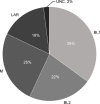Targeting the androgen receptor in triple-negative breast cancer: current perspectives
- PMID: 29033586
- PMCID: PMC5614778
- DOI: 10.2147/OTT.S126051
Targeting the androgen receptor in triple-negative breast cancer: current perspectives
Abstract
Triple-negative breast cancer (TNBC) is an aggressive subtype associated with frequent recurrence and metastasis. Unlike hormone receptor-positive subtypes, treatment of TNBC is currently limited by the lack of clinically available targeted therapies. Androgen signaling is necessary for normal breast development, and its dysregulation has been implicated in breast tumorigenesis. In recent years, gene expression studies have identified a subset of TNBC that is enriched for androgen receptor (AR) signaling. Interference with androgen signaling in TNBC is promising, and AR-inhibiting drugs have shown antitumorigenic activity in preclinical and proof of concept clinical studies. Recent advances in our understanding of androgenic signaling in TNBC, along with the identification of interacting pathways, are allowing development of the next generation of clinical trials with AR inhibitors. As novel AR-targeting agents are developed and evaluated in clinical trials, it is equally important to establish a robust set of biomarkers for identification of TNBC tumors that are most likely to respond to AR inhibition.
Keywords: androgen signaling; biomarkers; prognosis; targeted therapy; triple-negative breast cancer.
Conflict of interest statement
Disclosure The authors report no conflicts of interest in this work.
Figures



References
-
- American Cancer Society . Cancer Facts and Figures 2017. Atlanta, GA: American Cancer Society; 2017.
-
- Dent R, Trudeau M, Pritchard KI, et al. Triple-negative breast cancer: clinical features and patterns of recurrence. Clin Cancer Res. 2007;13(15 Pt 1):4429–4434. - PubMed
-
- Bauer KR, Brown M, Cress RD, et al. Descriptive analysis of estrogen receptor (ER)-negative, progesterone receptor (PR)-negative, and HER2-negative invasive breast cancer, the so-called triple-negative phenotype: a population-based study from the California cancer registry. Cancer. 2007;109(9):1721–1728. - PubMed
-
- Loibl S, Muller BM, von Minckwitz G, et al. Androgen receptor expression in primary breast cancer and its predictive and prognostic value in patients treated with neoadjuvant chemotherapy. Breast Cancer Res Treat. 2011;130(2):477–487. - PubMed
Publication types
LinkOut - more resources
Full Text Sources
Other Literature Sources
Research Materials

